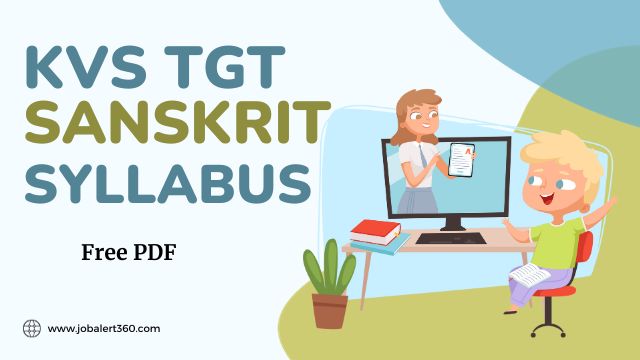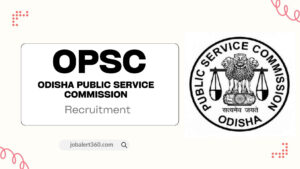Explore the comprehensive KVS TGT Sanskrit Syllabus designed to help you excel in the teaching field. This syllabus covers key topics and curriculum guidelines for Trained Graduate Teacher (TGT) aspirants. Get ready to enhance your Sanskrit proficiency and teaching skills with our detailed syllabus overview
KVS TGT Sanskrit Syllabus
Part 1
General English
1. Verb
2. Active Voice and Passive voice
3. Subject-Verb Agreement
4. Articles
5. Comprehension
6. Adverb
7. Error Correction
8. Sentence Rearrangement
9. Fill in the Blanks
10. Unseen Passages
11. Tenses and their types
12. Vocabulary
13. Antonyms
14. Synonyms
15. Grammar
16. Idioms & Phrases, etc.
General Hindi
1. Antonyms
2. Vocabulary
3. Fill in the Blanks
4. Error Detection
5. Translation of Sentences
6. Comprehension
7. Phrases/Muhavare
8. Error Detection
9. Grammar
10. Plural Forms etc
11. Synonyms
Part II – KVS TGT Sanskrit Syllabus
General Knowledge and Current Affairs
1. Indian Constitution
2. Geography
3. Important Financial & Economic News
4. Economy
5. Important Days
6. Important books and authors
7. Science Invention, Discovery and technology
8. Budget and key Important Points
9. Current Affairs
Reasoning Ability
1. Relationship concepts
2. Spatial Visualization
3. Theme Detection,
4. Number Series
5. Verbal Reasoning
6. Essential Part
7. Alphanumeric Series
8. Coded Inequalities
9. Logical Deduction
10. Seating Arrangement
11. Statement and Argument
12. Coding-Decoding
Computer Literacy
1. All about Computer Basics
2. Usage of Paint Brush
3. More in Paint
4.. About Desktop Important terms
5. Computer Peripherals,
6. Word Processor,
7. Formatting Word Document,
Part III
Perspectives on Education and Leadership
(a) Understanding the Learner
1. Concept of growth, maturation and development, principles and debates of development, development tasks and challenges
2. Domains of Development: Physical, Cognitive, Socio-emotional, Moral etc., deviations in development and its implications.
3. Understanding Adolescence: Needs, challenges and implications for designing institutional support.
4. Role of Primary and Secondary Socialization agencies. Ensuring Home school continuity.
(b) Understanding Teaching Learning
Theoretical perspectives on Learning -Behaviorism, Cognitivism and Constructivism with special reference to their implications for:
(i) The role of teacher
(ii) The role of learner
(iii) Nature of teacher-student relationship
(iv) Choice of teaching methods
(v) Classroom environment
(vi) Understanding of discipline, power etc.
Factors affecting learning and their implications for:
(i) Designing classroom instructions,
(ii) Planning student activities and,
(iii) Creating learning spaces in school.
Planning and Organization of Teaching-Learning
(i) Concept of Syllabus and Curriculum, Overt and Hidden Curriculum
(ii) Foundational Literacy and Numeracy, Early Childhood Care and Education
(iii) Competency based Education, Experiential learning, etc.
(iv) Instructional Plans: -Year Plan, Unit Plan, Lesson Plan
(v) Instructional material and resources
(vi) Information and Communication Technology(ICT) for teaching-learning
(vii) Assessment of learning, for learning and as learning: Meaning, purpose and considerations in planning each.
Enhancing Teaching Learning processes: Classroom Observation and Feedback, Reflections and Dialogues as a means of constructivist teaching
(c) Creating Conducive Learning Environment
1. The concepts of Diversity, disability and Inclusion, implications of disability as social construct, types of disabilities-their identification and interventions
2. Concept of School Mental Health, addressing the curative, preventive and promotive dimensions of mental health for all students and staff. Provisioning for guidance and counselling.
3. Developing School and community as a learning resource.
(d) School Organization and Leaders-hip
1. Leader as reflective practitioner, team builder, initiator, coach and mentor.
2. Perspectives on School Leadership: instructional, distributed and transformative
3. Vision building, goal setting and creating a School development Plan
4. Using School Processes and forums for strengthening teaching learning-Annual Calendar, time-tabling, parent teacher forums, school assembly, teacher development forums , using achievement data for improving teaching —learning, School Self Assessment and Improvement
5. Creating partnerships with community , industry and other neighbouring schools and Higher Education Institutes — forming learning communities
(e) Perspectives in Education
1. NEP-2020: Early Childhood Care and Education: The Foundation of Learning ; Foundational Literacy and Numeracy; Curriculum and Pedagogy in Schools: Holistic & Integrated Learning; Equitable and Inclusive Education: Learning for All; Competency based learning and Education.
2. Guiding Principles for Child Rights, Protecting and provisioning for rights of children to safe and secure school environment, Right of Children to free and Compulsory Education Act, 2009,
3. Historically studying the National Policies in education with special reference to school education;
4. School Curriculum Principles: Perspective, Learning and Knowledge, Curricular Areas, School Stages — Pedagogy & Assessment.
Sanskrit Language and Literature :
1. Origin and development of sanskrit
2. History of literature
3. Ancient History of India
4. General study of following works
5. Kathopnishad
6. Bhagavad Gita
7. Bush Charitam
8. Swapna Basvadattam
9. Abhigyanshakuntalam
10. Meghdootam
11. Raghuvansham
12. Kumarsambhavam
13. Mrichhkatikam
14. Kiratajuniyam
15. Shishupal Vaddham
16. Uttar ramcharittam
17. Mudrakshash
18. Neshadhvitram
19. Raj Tirangini
20. Nitishaktam
21. Kadambari
22. Harshcharitam
23. Danshkumarcharitam
24. Prabodh Chandrodayam
KVS TGT Sanskrit Syllabus Download Link
| KVS TGT Sanskrit Syllabus | Download |
| Official Website | Click Here |
Read Syllabus Blog
UGC net Sanskrit syllabus CTET Sanskrit Syllabus Odisha Fireman Syllabus SSC Delhi Police Constable Executive Syllabus Indian Navy Tradesman Mate Exam Syllabus Balasore Law College Syllabus OAVS TGT Science Syllabus 2023 KVS Junior Secretariat Assistant Syllabus BEd Syllabus Odisha 2023 EMRS Hostel Warden Syllabus SSC SI Delhi Police Syllabus Odisha Jail warder Syllabus OSSSC PEO Syllabus 2023 and Exam Pattern OSSC TGT Teacher Syllabus 2023 & Exam Pattern PDF Download High School Teacher Syllabus Odisha





